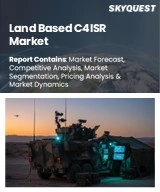
|
시장보고서
상품코드
1675438
C4ISR 시장 : 플랫폼별, 솔루션별, 최종 용도 부문별, 애플리케이션별, 지역별(2025-2033년)C4ISR Market Report by Platform, Solution, End-Use Sector, Application, and Region 2025-2033 |
||||||
세계의 C4ISR 시장 규모는 2024년에 1,366억 달러에 달했습니다. IMARC Group은 2025-2033년의 성장률(CAGR)이 3.53%로, 2033년에는 1,898억 달러에 달할 것으로 예측하고 있습니다. 군비의 증가, 방위 분야에서의 자금 증가 등이 시장 성장에 박차를 가하고 있습니다.
C4ISR은 지휘, 통제, 통신, 컴퓨터, 정보, 감시, 정찰 시스템의 집합체로 주로 국방 및 군 분야에서 사용됩니다. C4ISR은 육상, 공중, 해상, 우주, 사이버 공간에서 정보 수집을 위해 장비 및 기타 자원을 효율적으로 사용하여 특정 장소의 상황 인식을 높이고 의사결정을 개선하며, 육상 레이더, 쌍안경, 통신 위성 등 정보를 수집하고 방송하는 다양한 절차 및 기술로 구성됩니다. 으로 구성되어 있습니다. 데이터는 정밀한 표적 설정 및 지역적 위치 측정을 위해 추가 처리, 분석, 사용 및 전달됩니다. 예를 들어 다양한 전자전 시스템은 컴퓨터로 공격 및 방어 임무를 수행하고 적대적 상황을 관리하는 데 사용됩니다.
C4ISR 시장 동향 :
전자, 광전자, 정보기술(IT) 분야의 급속한 발전과 증가하는 범죄 및 테러 활동에 대응해야 할 필요성이 증가함에 따라 C4ISR 시스템은 군 작전 수행 및 대원 간 정보 전달을 위해 보안 기관에 널리 채택되고 있습니다. 채택되고 있습니다. 또한 영토 분쟁이나 적대적 이웃 국가의 침략 등 안보 위협을 경험하는 국가는 적의 움직임을 파악하고 고위험 군 작전을 수행하기 위해 C4ISR 시스템을 채택하는 사례가 증가하고 있습니다. 또한 무인차량, 합성개구레이더, 센서 등 공중 시스템의 등장도 시장 성장을 가속하고 있습니다. 저전력, 경량 장비 및 시스템 개발, 사물인터넷(IoT)과의 통합과 같은 제품 혁신은 시장을 더욱 견인할 것으로 예상됩니다. 이와는 별도로, 국방 분야에서의 정부 자금 증가는 시장에 긍정적인 전망을 가져다주고 있습니다.
IMARC Group의 최신 보고서는 세계 C4ISR 시장에 대한 모든 중요한 측면을 심층적으로 분석했습니다. 시장 거시적 개요, 업계 실적의 미시적 세부 사항, 최근 동향, 시장 성장 촉진요인 및 과제, SWOT 분석, Portre's Five Forces 분석, 밸류체인 분석 등 다양한 내용을 담고 있습니다. 이 보고서는 업계 관계자, 투자자, 연구원, 컨설턴트, 비즈니스 전략가, 그리고 어떤 형태로든 C4ISR 산업과 이해관계가 있거나 C4ISR 산업 진출을 계획하고 있는 모든 분들에게 꼭 필요한 보고서입니다.
이 보고서에서 다룬 주요 질문
- 2024년 세계 C4ISR 시장 규모는?
- 2025-2033년 세계 C4ISR 시장의 예상 성장률은?
- 세계 C4ISR 시장을 촉진하는 주요 요인은?
- COVID-19가 세계 C4ISR 시장에 미치는 영향은?
- 전 세계 C4ISR 시장의 플랫폼별 분석은?
- 전 세계 C4ISR 시장의 솔루션별 분석은?
- 전 세계 C4ISR 시장의 최종 용도별 시장 현황은?
- 세계 C4ISR 시장의 용도별 분류는?
- 세계 C4ISR 시장의 주요 지역은?
- 세계 C4ISR 시장의 주요 기업은?
목차
제1장 서문
제2장 조사 범위와 조사 방법
- 조사의 목적
- 이해관계자
- 데이터 소스
- 1차 정보
- 2차 정보
- 시장 추정
- 보텀업 어프로치
- 톱다운 어프로치
- 조사 방법
제3장 개요
제4장 서론
- 개요
- 주요 업계 동향
제5장 세계의 C4ISR 시장
- 시장 개요
- 시장 실적
- COVID-19의 영향
- 시장 예측
제6장 시장 내역 : 플랫폼별
- 육상
- 해군
- 공중
- 우주
제7장 시장 내역 : 솔루션별
- 제품
- 서비스
제8장 시장 내역 : 최종 용도 부문별
- 방위
- 상업
제9장 시장 내역 : 애플리케이션별
- 인텔리전스
- 감시·정찰
- 전자전
- 컴퓨터
- 통신
- C&C
- 기타
제10장 시장 내역 : 지역별
- 북미
- 미국
- 캐나다
- 아시아태평양
- 중국
- 일본
- 인도
- 한국
- 호주
- 인도네시아
- 기타
- 유럽
- 독일
- 프랑스
- 영국
- 이탈리아
- 스페인
- 러시아
- 기타
- 라틴아메리카
- 브라질
- 멕시코
- 기타
- 중동 및 아프리카
- 시장 내역 : 국가별
제11장 SWOT 분석
- 개요
- 강점
- 약점
- 기회
- 위협
제12장 밸류체인 분석
제13장 Porter's Five Forces 분석
- 개요
- 바이어의 교섭력
- 공급 기업의 교섭력
- 경쟁의 정도
- 신규 진출업체의 위협
- 대체품의 위협
제14장 경쟁 구도
- 시장 구조
- 주요 기업
- 주요 기업의 개요
- CACI International Inc.
- BAE Systems
- General Dynamics Corporation
- Elbit Systems
- L3Harris Technologies, Inc.
- Leonardo S.P.A.
- Lockheed Martin
- Northrop Grumman
- Raytheon
- Rheinmetall
- Rockwell Collins Inc.
- Saab AB
- Serco
- Thales Group
The global C4ISR market size reached USD 136.6 Billion in 2024. Looking forward, IMARC Group expects the market to reach USD 189.8 Billion by 2033, exhibiting a growth rate (CAGR) of 3.53% during 2025-2033. The increasing military spending capacities, along with the growing funding in the defense sector, are fueling the market growth.
C4ISR refers to a collection of Command, Control, Communications, Computers, Intelligence, Surveillance and Reconnaissance systems, which are primarily used in the defense and military sector. It aids in increasing situational awareness of a particular location, improved decision making, and efficient usage of equipment and other resources for gathering intelligence across land, air, sea, space and cyberspace. The C4ISR also consists of various procedures and techniques to collect and broadcast information, including land-based radars, binoculars and communication satellites. The data is further processed, analyzed, used and delivered for precision targeting and geo-positioning. For instance, various electronic warfare systems are used for conducting computerized attacks, defense missions and manage hostile conditions.
C4ISR Market Trends:
Rapid developments in the field of electronics, optoelectronics and Information Technology (IT), along with the growing need to combat the rising number of criminal and terrorist activities are among the key factors driving the growth of the market. C4ISR systems are extensively employed by security agencies to accomplish military operations and disseminate intelligence among their ranks. Furthermore, nations experiencing security threat such as territorial disputes and aggression from hostile neighbors are increasingly employing C4ISR systems to gauge enemy movements and conduct high-risk military operations. Additionally, the advent of airborne systems, including unmanned vehicles, synthetic aperture radars and sensors, is also catalyzing the growth of the market. Product innovations, such as the development of low-power consuming and light-weight equipment and systems and the integration with the Internet of Things (IoT) are projected to drive the market further. Apart from this, rising government funding in the defense sector is creating a positive outlook for the market.
IMARC Group's latest report provides a deep insight into the global C4ISR market covering all its essential aspects. This ranges from macro overview of the market to micro details of the industry performance, recent trends, key market drivers and challenges, SWOT analysis, Porter's five forces analysis, value chain analysis, etc. This report is a must-read for industry players, investors, researchers, consultants, business strategists, and all those who have any kind of stake or are planning to foray into the C4ISR industry in any manner.
Key Market Segmentation:
Breakup by Platform:
- Land
- Naval
- Airborne
- Space
Breakup by Solution:
- Products
- Services
Breakup by End-Use Sector:
- Defense
- Commercial
Breakup by Application:
- Intelligence
- Surveillance & Reconnaissance
- Electronic Warfare
- Computers
- Communication
- Command & Control
- Others
Breakup by Region:
- North America
- United States
- Canada
- Asia Pacific
- China
- Japan
- India
- South Korea
- Australia
- Indonesia
- Others
- Europe
- Germany
- France
- United Kingdom
- Italy
- Spain
- Russia
- Others
- Latin America
- Brazil
- Mexico
- Others
- Middle East and Africa
Competitive Landscape:
The competitive landscape of the industry has also been examined with some of the key players being CACI International Inc., BAE Systems, General Dynamics Corporation, Elbit Systems, L3Harris Technologies, Inc., Leonardo S.P.A., Lockheed Martin, Northrop Grumman, Raytheon, Rheinmetall, Rockwell Collins Inc., Saab AB, Serco, Thales Group, etc.
Key Questions Answered in This Report
- 1.What was the size of the global C4ISR market in 2024?
- 2.What is the expected growth rate of the global C4ISR market during 2025-2033?
- 3.What are the key factors driving the global C4ISR market?
- 4.What has been the impact of COVID-19 on the global C4ISR market?
- 5.What is the breakup of the global C4ISR market based on the platform?
- 6.What is the breakup of the global C4ISR market based on the solution?
- 7.What is the breakup of the global C4ISR market based on the end-use sector?
- 8.What is the breakup of the global C4ISR market based on the application?
- 9.What are the key regions in the global C4ISR market?
- 10.Who are the key players/companies in the global C4ISR market?
Table of Contents
1 Preface
2 Scope and Methodology
- 2.1 Objectives of the Study
- 2.2 Stakeholders
- 2.3 Data Sources
- 2.3.1 Primary Sources
- 2.3.2 Secondary Sources
- 2.4 Market Estimation
- 2.4.1 Bottom-Up Approach
- 2.4.2 Top-Down Approach
- 2.5 Forecasting Methodology
3 Executive Summary
4 Introduction
- 4.1 Overview
- 4.2 Key Industry Trends
5 Global C4ISR Market
- 5.1 Market Overview
- 5.2 Market Performance
- 5.3 Impact Of COVID-19
- 5.4 Market Forecast
6 Market Breakup by Platform
- 6.1 Land
- 6.1.1 Market Trends
- 6.1.2 Market Forecast
- 6.2 Naval
- 6.2.1 Market Trends
- 6.2.2 Market Forecast
- 6.3 Airborne
- 6.3.1 Market Trends
- 6.3.2 Market Forecast
- 6.4 Space
- 6.4.1 Market Trends
- 6.4.2 Market Forecast
7 Market Breakup by Solution
- 7.1 Products
- 7.1.1 Market Trends
- 7.1.2 Market Forecast
- 7.2 Services
- 7.2.1 Market Trends
- 7.2.2 Market Forecast
8 Market Breakup by End-Use Sector
- 8.1 Defense
- 8.1.1 Market Trends
- 8.1.2 Market Forecast
- 8.2 Commercial
- 8.2.1 Market Trends
- 8.2.2 Market Forecast
9 Market Breakup by Application
- 9.1 Intelligence
- 9.1.1 Market Trends
- 9.1.2 Market Forecast
- 9.2 Surveillance & Reconnaissance
- 9.2.1 Market Trends
- 9.2.2 Market Forecast
- 9.3 Electronic Warfare
- 9.3.1 Market Trends
- 9.3.2 Market Forecast
- 9.4 Computers
- 9.4.1 Market Trends
- 9.4.2 Market Forecast
- 9.5 Communication
- 9.5.1 Market Trends
- 9.5.2 Market Forecast
- 9.6 Command & Control
- 9.6.1 Market Trends
- 9.6.2 Market Forecast
- 9.7 Others
- 9.7.1 Market Trends
- 9.7.2 Market Forecast
10 Market Breakup by Region
- 10.1 North America
- 10.1.1 United States
- 10.1.1.1 Market Trends
- 10.1.1.2 Market Forecast
- 10.1.2 Canada
- 10.1.2.1 Market Trends
- 10.1.2.2 Market Forecast
- 10.1.1 United States
- 10.2 Asia Pacific
- 10.2.1 China
- 10.2.1.1 Market Trends
- 10.2.1.2 Market Forecast
- 10.2.2 Japan
- 10.2.2.1 Market Trends
- 10.2.2.2 Market Forecast
- 10.2.3 India
- 10.2.3.1 Market Trends
- 10.2.3.2 Market Forecast
- 10.2.4 South Korea
- 10.2.4.1 Market Trends
- 10.2.4.2 Market Forecast
- 10.2.5 Australia
- 10.2.5.1 Market Trends
- 10.2.5.2 Market Forecast
- 10.2.6 Indonesia
- 10.2.6.1 Market Trends
- 10.2.6.2 Market Forecast
- 10.2.7 Others
- 10.2.7.1 Market Trends
- 10.2.7.2 Market Forecast
- 10.2.1 China
- 10.3 Europe
- 10.3.1 Germany
- 10.3.1.1 Market Trends
- 10.3.1.2 Market Forecast
- 10.3.2 France
- 10.3.2.1 Market Trends
- 10.3.2.2 Market Forecast
- 10.3.3 United Kingdom
- 10.3.3.1 Market Trends
- 10.3.3.2 Market Forecast
- 10.3.4 Italy
- 10.3.4.1 Market Trends
- 10.3.4.2 Market Forecast
- 10.3.5 Spain
- 10.3.5.1 Market Trends
- 10.3.5.2 Market Forecast
- 10.2.6 Russia
- 10.2.6.1 Market Trends
- 10.2.6.2 Market Forecast
- 10.2.7 Others
- 10.2.7.1 Market Trends
- 10.2.7.2 Market Forecast
- 10.3.1 Germany
- 10.4 Latin America
- 10.4.1 Brazil
- 10.4.1.1 Market Trends
- 10.4.1.2 Market Forecast
- 10.4.2 Mexico
- 10.4.2.1 Market Trends
- 10.4.2.2 Market Forecast
- 10.4.3 Others
- 10.4.3.1 Market Trends
- 10.4.3.2 Market Forecast
- 10.4.1 Brazil
- 10.5 Middle East and Africa
- 10.5.1 Market Trends
- 10.5.2 Market Breakup by Country
- 10.5.3 Market Forecast
11 SWOT Analysis
- 11.1 Overview
- 11.2 Strengths
- 11.3 Weaknesses
- 11.4 Opportunities
- 11.5 Threats
12 Value Chain Analysis
13 Porters Five Forces Analysis
- 13.1 Overview
- 13.2 Bargaining Power of Buyers
- 13.3 Bargaining Power of Suppliers
- 13.4 Degree of Competition
- 13.5 Threat of New Entrants
- 13.6 Threat of Substitutes
14 Competitive Landscape
- 14.1 Market Structure
- 14.2 Key Players
- 14.3 Profiles of Key Players
- 14.3.1 CACI International Inc.
- 14.3.1.1 Company Overview
- 14.3.1.2 Product Portfolio
- 14.3.2 BAE Systems
- 14.3.2.1 Company Overview
- 14.3.2.2 Product Portfolio
- 14.3.2.3 Financials
- 14.3.2.4 SWOT Analysis
- 14.3.3 General Dynamics Corporation
- 14.3.3.1 Company Overview
- 14.3.3.2 Product Portfolio
- 14.3.3.3 Financials
- 14.3.3.4 SWOT Analysis
- 14.3.4 Elbit Systems
- 14.3.4.1 Company Overview
- 14.3.4.2 Product Portfolio
- 14.3.4.3 Financials
- 14.3.5 L3Harris Technologies, Inc.
- 14.3.5.1 Company Overview
- 14.3.5.2 Product Portfolio
- 14.3.6 Leonardo S.P.A.
- 14.3.6.1 Company Overview
- 14.3.6.2 Product Portfolio
- 14.3.6.3 Financials
- 14.3.6.4 SWOT Analysis
- 14.3.7 Lockheed Martin
- 14.3.7.1 Company Overview
- 14.3.7.2 Product Portfolio
- 14.3.7.3 Financials
- 14.3.7.4 SWOT Analysis
- 14.3.8 Northrop Grumman
- 14.3.8.1 Company Overview
- 14.3.8.2 Product Portfolio
- 14.3.8.3 Financials
- 14.3.8.4 SWOT Analysis
- 14.3.9 Raytheon
- 14.3.9.1 Company Overview
- 14.3.9.2 Product Portfolio
- 14.3.9.3 Financials
- 14.3.9.4 SWOT Analysis
- 14.3.10 Rheinmetall
- 14.3.10.1 Company Overview
- 14.3.10.2 Product Portfolio
- 14.3.10.3 Financials
- 14.3.11 Rockwell Collins Inc.
- 14.3.11.1 Company Overview
- 14.3.11.2 Product Portfolio
- 14.3.12 Saab AB
- 14.3.12.1 Company Overview
- 14.3.12.2 Product Portfolio
- 14.3.12.3 Financials
- 14.3.12.4 SWOT Analysis
- 14.3.13 Serco
- 14.3.13.1 Company Overview
- 14.3.13.2 Product Portfolio
- 14.3.13.3 Financials
- 14.3.13.4 SWOT Analysis
- 14.3.14 Thales Group
- 14.3.14.1 Company Overview
- 14.3.14.2 Product Portfolio
- 14.3.1 CACI International Inc.

















